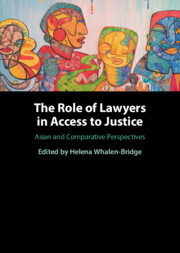Book contents
- The Role of Lawyers in Access to Justice
- The Role of Lawyers in Access to Justice
- Copyright page
- Dedication
- Epigraph
- Contents
- Figures
- Tables
- Appendices
- Contributors
- Foreword
- Acknowledgements
- Abbreviations
- 1 Understanding and Comparing Access to Justice
- Part I Access to Justice in Asia
- 2 Pro Bono, Legal Aid, and the Struggle for Justice in China
- 3 Access to Justice in India: Managing Multiple Mechanisms in a Restrictive Practice Environment
- 4 Access to Justice in Indonesia: Searching for Meaning
- 5 Access to Justice and Lawyer Independence in Japan
- 6 Improving Access to Justice in Malaysia: Introspection, Purpose, and Dynamism
- 7 Political Lawyers and the Legal Occupation in Myanmar
- 8 Alternative Lawyering versus Pro Bono in the Philippines: From Challenging an Authoritarian Government to Working with the State
- 9 Access to Justice in Singapore: A Government and Lawyer Dynamic
- 10 Public Interest Lawyering in South Korea: Standing on the Shoulders of Giants
- 11 A Hub, a Knot, and a Powerhouse: The Legal Aid Foundation and Access to Justice in Taiwan
- 12 Lawyers and Democratic Centralism in Vietnam
- Part II Comparative Perspectives on Access to Justice
- Index
10 - Public Interest Lawyering in South Korea: Standing on the Shoulders of Giants
from Part I - Access to Justice in Asia
Published online by Cambridge University Press: 29 September 2022
- The Role of Lawyers in Access to Justice
- The Role of Lawyers in Access to Justice
- Copyright page
- Dedication
- Epigraph
- Contents
- Figures
- Tables
- Appendices
- Contributors
- Foreword
- Acknowledgements
- Abbreviations
- 1 Understanding and Comparing Access to Justice
- Part I Access to Justice in Asia
- 2 Pro Bono, Legal Aid, and the Struggle for Justice in China
- 3 Access to Justice in India: Managing Multiple Mechanisms in a Restrictive Practice Environment
- 4 Access to Justice in Indonesia: Searching for Meaning
- 5 Access to Justice and Lawyer Independence in Japan
- 6 Improving Access to Justice in Malaysia: Introspection, Purpose, and Dynamism
- 7 Political Lawyers and the Legal Occupation in Myanmar
- 8 Alternative Lawyering versus Pro Bono in the Philippines: From Challenging an Authoritarian Government to Working with the State
- 9 Access to Justice in Singapore: A Government and Lawyer Dynamic
- 10 Public Interest Lawyering in South Korea: Standing on the Shoulders of Giants
- 11 A Hub, a Knot, and a Powerhouse: The Legal Aid Foundation and Access to Justice in Taiwan
- 12 Lawyers and Democratic Centralism in Vietnam
- Part II Comparative Perspectives on Access to Justice
- Index
Summary
A salient feature of legal aid in South Korea is the presence of the state-subsidized legal aid institution, the Korea Legal Aid Corporation. It is large in comparison to private sector involvement in access to justice, although there are concerns that state-subsidized legal aid still falls short of providing sufficient legal services to the public. Private lawyer involvement in access to justice began with the tradition of human rights lawyers during the democracy movement in the 1970s and 80s, and grew into the current practice of public interest lawyering. While the number of public interest lawyers is not big enough, they have made significant progress in advancing public interest agendas. The more recent voluntary pro bono initiatives led by major law firms arose in part to address increasing scrutiny from civil society, and they have also been the site of considerable growth. A different kind of scrutiny led South Korea to adopt a mandatory pro bono requirement by the Attorney-at-Law Act of 2000. Even though the mandatory requirement scheme has been criticized for its vague scope of public interest activities and lack of penalties for non-compliance, the requirement has positively impacted law firm pro bono and access to justice.
- Type
- Chapter
- Information
- The Role of Lawyers in Access to JusticeAsian and Comparative Perspectives, pp. 178 - 205Publisher: Cambridge University PressPrint publication year: 2022



